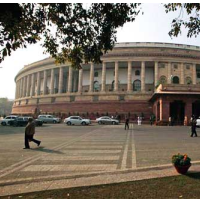MPs and Their Conflicts of Interest
 MPs are joining parliamentary committees to influence decisions in areas where they have a business interest (file photo)
MPs are joining parliamentary committees to influence decisions in areas where they have a business interest (file photo)
Prime Minister Narendra Modi has reportedly stepped in and made it clear that MPs who have a conflict of interest should avoid becoming members of parliamentary committees. The follows a committee shooting down the government’s proposal to increase the size of pictorial warnings on cigarette and beedi packets – it was later revealed that panel member BJP MP Shyama Charan Gupta has a beedi business with an annual turnover of over Rs 200 crore ($32 million).
A beedi baron claiming that beedis have “nil” harmful effects – this is not the only blatant conflict of interest in our parliamentary panels.
The select committee that gave its nod to the mining bill last month included Biju Janata Dal leader Kalpataru Das, whose son, also a BJD MLA, runs a mineral transport business – Balabantaray Transport and Minerals Private Ltd – that does business worth crores of rupees with mining firms in Odisha, such as Serajjudin and Rungta Group.
Meanwhile, Samajwadi Party MP Dr Chandrapal Singh Yadav heads fertiliser company Kribhco (Krishak Bharati Cooperative Ltd) while also sitting in the parliamentary standing committee on chemicals and fertilisers.
Yadav was included as a member of the standing committee on January 29 this year. A fortnight later, he was elected Kribhco chairman.
The committee that Yadav sits in makes key decisions on fertilisers, such as pricing, subsidy, demand, production, imports, incentives, investments and movement.
According to the Indian Express, until last week, neither Yadav nor standing committee chairman Anandrao Adsul had informed Lok Sabha Speaker Sumitra Mahajan of his Kribhco appointment.
With these revelations, it’s clear that many MPs are getting on to parliamentary committees to influence decisions in areas where they have a business interest.
The controversy over tobacco has now focused the public’s attention on this practice. It will suddenly become more difficult for our representatives to operate as they have so far - expect the rules to be tightened and any whiff of a conflict of interest will be difficult to explain away.
In one sector at least, a committee and its members have failed to influence events. The Prime Minister has directed the Health Ministry to increase the size of the pictorial warning on tobacco packs to 65 per cent and to ignore the views of anyone with a conflict of interest.
- Karan Singh
To Learn More:
PM wants MPs with conflict of interest out of House panels (by Jatin Gandhi, The Hindu)
Tobacco warnings: Conflict of interest must be declared, says Venkaiah (Indian Express)
MPs having conflict of interest should declare it, says Venkaiah Naidu (PTI)
BJP beedi baron not alone: SP MP in fertiliser panel is Kribhco chief (by Amitav Ranjan, Indian Express)
Vested interests a major cause of conflicts within the parliamentary panel (by Meera Mohanty, Economic Times)
- Top Stories
- Controversies
- Where is the Money Going?
- India and the World
- Appointments and Resignations
- Unusual News
- Latest News
- India College Chain’s Expansion into U.S. Draws Opposition from Massachusetts Officials over Quality of Education
- Milk Shortages in India Tied to Release of New Movies Featuring Nation’s Favorite Stars
- Confusion Swirls around Kashmir Newspaper Ban in Wake of Violent Street Protests
- Polio-Free for 5 Years, India Launches Vaccine Drive after Polio Strain Discovery
- New Aviation Policy Could Increase Service, Lower Ticket Prices






Comments